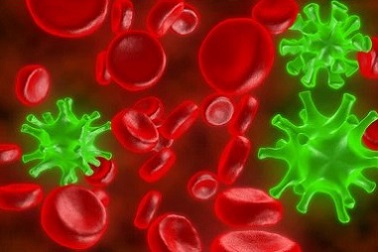Nikhil Prasad Fact checked by:Thailand Medical News Team Jun 03, 2024 10 months, 3 weeks, 1 day, 35 minutes ago
Long COVID: As the world continues to grapple with the aftermath of the COVID-19 pandemic, new challenges arise, particularly concerning the long-term effects experienced by survivors. A recent Dutch study has brought attention to a potential link between hemoglobin levels and the persistent fatigue seen in Long COVID patients. Conducted by researchers from several prominent institutions, including the University of Amsterdam and Maastricht University, this study delves into the complex interplay between hemoglobin levels and fatigue months after the initial SARS-CoV-2 infection.
 Study Sheds Light on Hemoglobin Levels and Fatigue in Long COVID
Understanding Hemoglobin's Role
Study Sheds Light on Hemoglobin Levels and Fatigue in Long COVID
Understanding Hemoglobin's Role
Hemoglobin, a protein in red blood cells responsible for transporting oxygen throughout the body, has been found to be potentially impacted by COVID-19. This study aimed to investigate the correlation between hemoglobin levels and inflammatory biomarkers, and to evaluate whether hemoglobin levels are associated with fatigue in
Long COVID patients.
The Cohort
The study involved 95 patients, predominantly aged 40-65, who had been hospitalized due to COVID-19. These participants were assessed 3-6 months post-infection, focusing on their venous hemoglobin concentration, anemia status (defined as hemoglobin levels below 7.5 mmol/L for women and 8.5 mmol/L for men), and various inflammatory blood biomarkers. Additionally, the study measured fatigue using the Fatigue Severity Score (FSS) and recorded relevant demographic and clinical features.
Methodology
Researchers utilized Spearman correlation to analyze the relationship between hemoglobin concentrations and inflammatory biomarkers. They also employed logistic regression to examine the association between hemoglobin levels and fatigue.
Key Findings: Hemoglobin Levels and Fatigue
-Anemia and Its Impact
At the 3-6 month follow-up, 16.4% of participants were found to be anemic. Interestingly, the mean hemoglobin value increased by 0.3 mmol/L compared to levels during the acute phase of the infection, suggesting some recovery over time. Despite this increase, a significant finding was that a 1 mmol/L greater increase in hemoglobin was associated with a decreased likelihood of experiencing fatigue (adjusted OR 0.38 [95%CI 0.13–1.09]).
-Hemoglobin and Inflammatory Biomarkers
Contrary to expectations, the study did not find a correlation between hemoglobin levels and the inflammatory biomarkers examined. This suggests that while inflammation might play a role in acute COVID-19 anemia, other factors could be contributing to the sustained low hemoglobin levels seen in Long COVID patients.
-Statistical Associations
Patients with lower hemoglobin levels during both the acute phase and follow-up were more likely to experience fatigue. Specifically, those with fatigue had lower hemoglobin levels at fol
low-up (8.54 mmol/L) compared to those without fatigue (9.24 mmol/L). This association indicates that hemoglobin levels might play a crucial role in the persistent fatigue experienced by Long COVID patients.
-Gender Differences
The study also highlighted gender differences in hemoglobin levels and fatigue. Women reported higher levels of fatigue (83.3%) compared to men (68.9%). Interestingly, women also had lower mean hemoglobin levels (8.36 mmol/L) compared to men (9.04 mmol/L) during the Long COVID phase. This finding suggests that gender-specific factors, including potential hormonal influences, might impact hemoglobin levels and fatigue.
Beyond Hemoglobin - Broader Implications
While the study's findings underscore the potential role of hemoglobin in Long COVID fatigue, they also point to the complexity of this condition. The lack of correlation between hemoglobin and inflammatory biomarkers suggests that other mechanisms, such as oxidative stress or altered iron metabolism, might be at play. Additionally, the study calls for further research into the role of hemoglobin in Long COVID and the potential benefits of monitoring and managing hemoglobin levels in these patients.
Limitations and Future Directions
The study acknowledges several limitations, including its observational nature and the relatively small sample size. Moreover, the lack of pre-infection hemoglobin data makes it challenging to assess the true impact of COVID-19 on hemoglobin levels. Future research should aim to include larger cohorts and consider additional inflammatory and oxidative stress markers to gain a more comprehensive understanding of the mechanisms driving Long COVID symptoms.
Conclusion: Navigating the Path Forward
This Dutch study provides valuable insights into the potential role of hemoglobin levels in Long COVID fatigue, highlighting the need for continued research and tailored clinical management. As the world learns to navigate the long-term consequences of COVID-19, such studies are crucial in guiding effective treatment strategies and improving the quality of life for those affected by Long COVID.
The study findings were published in the peer reviewed journal: Biomedicines.
https://www.mdpi.com/2227-9059/12/6/1234
For the latest on
Long COVID, keep on logging to Thailand Medical News.
Read Also:
https://www.thailandmedical.news/news/brazilian-study-confirms-that-sars-cov-2-proteins-binds-not-only-to-metabolites-of-hemoglobin-like-biliverdin-but-also-to-hemoglobin-itself
https://www.thailandmedical.news/news/covid-19-news-study-validates-that-sars-cov-2-structural-proteins-binds-to-hemoglobin-and-myoglobin-causing-hemoglobin-and-iron-dysmetabolism
https://www.thailandmedical.news/news/covid-19-news-italian-study-validates-that-spike-proteins-of-sars-cov-2-bind-to-hemoglobin
https://www.thailandmedical.news/news/covid-19-news-mild-covid-19-can-cause-serious-hematological-issues-such-as-pancytopenia,-paroxysmal-nocturnal-hemoglobinuria-and-aplastic-anemia
https://www.thailandmedical.news/news/must-read-research-reveals-that-covid-19-attacks-hemoglobin-in-red-blood-cells,-rendering-it-incapable-of-transporting-oxygen--current-medical-protoco
